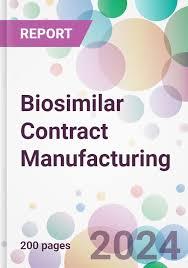Biosimilar Contract Manufacturing Market Regional Share: Distribution and Investment Opportunities

The Biosimilar Contract Manufacturing Market Regional Share analysis reveals the geographic distribution of production capacity, investment focus, and market adoption across global regions. North America continues to hold the largest share, driven by robust healthcare infrastructure, extensive R&D investments, and early adoption of outsourcing for biosimilar production. The U.S. pharmaceutical industry heavily relies on CMOs for advanced manufacturing capabilities, ensuring regulatory compliance and maintaining high-quality standards. Europe follows closely, with countries such as Germany, the UK, and France leveraging strong regulatory frameworks and mature biopharmaceutical ecosystems to secure a significant portion of the market share.
Asia-Pacific is emerging as the fastest-growing region, reflecting increasing local and global demand for cost-effective biosimilars. China, India, and Japan are expanding CMO facilities and investing in advanced production technologies to capture this growing market. Latin America and the Middle East are gradually increasing their presence through strategic partnerships and localized manufacturing solutions. Understanding regional share is critical for CMOs and pharmaceutical companies to develop targeted strategies, optimize resources, and maximize market penetration. Regional analysis provides insights into competitive positioning, investment priorities, and long-term growth opportunities in the global biosimilar contract manufacturing landscape.
FAQ
Q1: Which region currently holds the largest market share?
A1: North America, due to advanced infrastructure, R&D investments, and early adoption of outsourcing solutions.
Q2: Which region is growing the fastest?
A2: Asia-Pacific, driven by cost-effective manufacturing, government incentives, and rising demand for biosimilars.
Q3: How does Europe contribute to regional share?
A3: Through mature biopharmaceutical ecosystems, regulatory compliance, and technology-driven production.
Q4: Are Latin America and the Middle East significant for market expansion?
A4: Yes, these regions are gradually increasing presence via strategic partnerships and localized manufacturing.
Q5: Why is understanding regional share important for stakeholders?
A5: It helps optimize investment strategies, resource allocation, and competitive positioning in global markets.
- Art
- Causes
- Crafts
- Dance
- Drinks
- Film
- Fitness
- Food
- Games
- Gardening
- Health
- Home
- Literature
- Music
- Networking
- Other
- Party
- Religion
- Shopping
- Sports
- Theater
- Wellness


